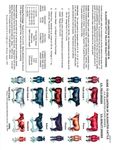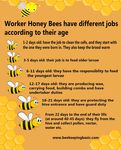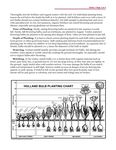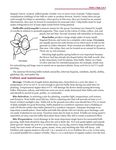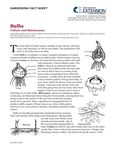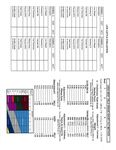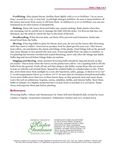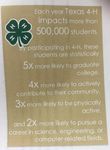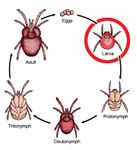HARRISON COUNTY AGRILIFE EXTENSION - 903-935-8413 102 W. HOUSTON MARSHALL, TX - Texas A&M AgriLife Extension ...
←
→
Page content transcription
If your browser does not render page correctly, please read the page content below
HARRISON COUNTY AGRILIFE EXTENSION
903-935-8413
102 W. HOUSTON MARSHALL, TX
JUNE AG/NR
NEWSLETTER
The members of Texas A&M AgriLife will provide equal opportunities in programs and activities, education, and
employment to all persons regardless of race, color, sex, religion, national origin, age, disability, genetic
information, veteran status, sexual orientation, gender identity, or any other classification protected by federal,
state, or local law and will strive to achieve full and equal employment opportunity throughout Texas A&M
AgriLife.After mowing, poor weather and handling conditions can lower hay quality. Rain can cause leaf
loss and can leach nutrients from plants during curing. Rain can leach out nutrients and increase
dry matter loss from respiration, which is the process by which a plant uses oxygen. Nutrient losses
depend on the amount, duration and timing of the rain in relation to cutting time.
Purdue University has conducted research on the amount of total digestible nutrients (TDN) and
field dry matter lost from hay after a rain. The study found that 1 inch of rain reduced the TDN
content of field-cured hay by 5 percentage points. Field dry matter losses from undried wind-rowed
hay were 3.5% per inch of rain. In general, fewer nutrients are leached out during a quick 1-inch
rain than during a slow, soaking 1-inch rain.
Rain-induced losses are much higher in drier hay than in hay that is fresh cut. Also, rain-soaked
hay must often be re-raked, which increases leaf losses. Although conditioning can reduce hay
drying time, rain causes greater nutrient losses for hay that has been conditioned or crushed.
Forage plants are living tissues that continue to respire when cut until the moisture content falls
below 40%. If the drying conditions are poor (such as with high humidity, cloudy skies or low
temperatures), the plant will use more of the readily digestible carbohydrates, sometimes up to 10
to 15% of the original dry matter.
Researchers at the Texas A&M AgriLife Research & Extension Center, Overton, TX studied the
effects of drying on the crude protein (CP) content and TDN of Coastal bermudagrass hay. They
found that the CP content dropped from 11.1% to 8.9% after 2 days of drying. In that same period,
TDN dropped from 51.6% to 42%.
To reduce haymaking losses, producers should:
Cut hay at the proper stage of maturity.
Cure the hay as fast as possible.
Minimize excess manipulation of the hay.
Bale the hay promptly when it is dry.
Store it according to bale type.
Vanessa Corriher-Olson
Professor, Forage Extension Specialist
Soil & Crop Sciences
Texas A&M AgriLife Extension, Overton,TX
vacorriher@ag.tamu.edu
903-834-6191Johnsongrass is a warm season perennial grass that
is one of the most common and troublesome weeds in
agriculture. It is commonly found on roadsides,
pastures and hay fields. It grows erect from 3 to 6 feet.
Johnsongrass spreads by seeds and rhizomes
(underground stems). The seedhead is a large, open
panicle often with a purplish tint. Johnsongrass leaves
have a large white midrib and a smooth, glossy
appearance. Stems are smooth with no hairs.
Select Herbicide Options:
Outrider (for bermudagrass pastures and
hay meadows, bahiagrass can be injured)
Pastora (for bermudagrass pastures, will
destroy bahiagrass)
Roundup (for bermudagrass pastures/hay
meadows will destroy bahiagrass)
REMEMBER: THE LABEL IS THE LAW!
Always read the pesticide label before
using.
Vanessa Corriher-Olson, Ph.D.
Forage Extension Specialist
Soil & Crop Sciences
Overton, TX
vacorriher@ag.tamu.edu
Texas A&M AgriLife Extension Service
Texas A&M University SystemTo sign your child up for 4-H go to v2.4honline.com and give us a call at the office!
Chiggers are my personal worst nightmare. They are tiny mites, barely visible to the eye, that live on
the soil surface and, in their larval stage, are parasites on humans and other vertebrate animals.
Chigger bites itch terribly for 1-2 days, then slowly shrink to mildly itchy red marks that take 1 or 2
weeks to disappear. The only good thing I can say about chiggers is that, as far as we know, they don’t
carry disease.
Bites typically occur in the most sensitive of places, especially around areas of tight clothing (belt line,
sock line) and thin, sensitive skin (you can imagine where).
So why do chiggers seem worse this year? If I had to guess, I’d say it’s been our high humidity and
above average temperatures the past month. Chiggers love hot and humid.
The most common places to encounter chiggers is in bramble patches, woods and fields with long
grass. But in a year like this, chiggers can be a problem even in manicured lawns. Chiggers are often
said to prefer shaded areas, but workers in our blazing-sun-drenched turfgrass plots at the Texas A&M
AgriLife Center in Dallas have annual problems with chiggers beginning around late May and early
June.
Your first protection against chiggers is a good repellent. DEET, our most popular mosquito repellent
provides significant protection against chiggers. Dusting sulfur is a cheap and convenient alternative
for some. Traditionally old-time Texans make it a habit to carry around an old sock filled with sulfur (in
the pickup truck of course). When getting out of the truck they swing the sock against their shoes and
lower legs to dust themselves before they set off to ride, roundup, plant, fix bob wire, or whatever else
good Texans do these days.
Here are my three tips for self protection in chigger country:
Use a good repellent, applying to your shoes, socks and pants
legs before stepping into chigger danger.
Tuck your pant legs into your socks to make it harder for
chiggers to get in your pants and find the tender places.
Scrub yourself well in the shower after you think you might
have been exposed. Chiggers typically take several hours to
settle down and begin feeding. If you can shower before they
begin chowing down, you can reduce the number and
severity of bites.
If you have chiggers in your lawn or backyard, consider using a
liquid insecticide spray like bifenthrin. These sprays can
significantly reduce chiggers. Before spraying, mow your lawn.
This reduces humidity on that critical soil surface and makes it
easier for sprays to contact the chiggers.
If your lawn is full of dandelions, clover or other flowers, make Mike Merchant
sure you spray for chiggers in the evening to avoid spraying
pollinators, like honey bees, while they are foraging. Follow all
citybugs.tamu.edu
label directions to avoid harm to good insects.Be sure to like us on Facebook to see
all of our upcoming events!
Texas A&M AgriLife Extension
102 W. Houston Marshall, TX
903-935-8413You can also read

